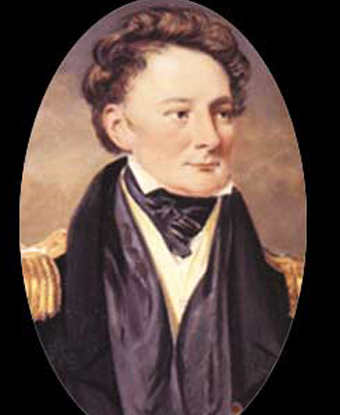Last updated: February 22, 2019
Person
Robert Heriot Barclay

NPS
“I trust that...the honor of His Majesty's flag has not been tarnished." These fateful words were penned to mitigate a lamented British defeat on Lake Erie on September 10, 1813; however, they also serve as a fitting epitaph to the brief but distinguished Royal Navy career of Captain Robert Heriot Barclay.
As a child, Barclay was short of stature, but an adept student and eager to prove himself on the high seas. As the nephew of Royal Navy Admiral William Duddingston, Barclay easily won a midshipman appointment in 1798, at only 12 years of age.
Barclay’s career in the Royal Navy was eventful immediately. By 1804 he had been involved in the capture of over a dozen ships, and was promoted to lieutenant by 1805. Leadership in his new rank was tested immediately at the Battle of Trafalgar, one of the most decisive victories in British naval history. Barclay was quickly promoted again, and assigned to the HMS Diana. This assignment proved to be more fateful; Barclay was wounded in a deadly foray between the Diana and a French merchant vessel in 1807, costing him his left arm.
With the nation gripped by the Napoleonic Wars, every trained and experienced officer was needed, even if not able-bodied. Barclay was shipped to Halifax in 1809, and then dispatched to Lake Erie in 1813. This assignment on the southernmost Great Lake was not a voluntary one; he was ordered to Lake Erie only after another officer declined the command, citing the deplorable conditions of the Lake Erie flotilla, and the fact that there would be little opportunity to gain glory on Lake Erie. The belief that Lake Erie would be an uneventful posting turned out to be inaccurate. Shortly after Barclay arrived on Lake Erie in June 1813, tensions with the Americans began to mount. Over the course of the next three months, the American navy would position themselves to block the British naval base from their supply route, requiring the undermanned, undertrained, and outgunned British flotilla to confront the Americans directly.
The Battle of Lake Erie ended disastrously for the British fleet. Barclay himself was severely wounded, and although court-martialed after, it was found that "the Officers and Men of His Majesty's late Squadron conducted themselves in the most gallant Manner." However, despite this acquittal, Barclay’s role leading the first total surrender in British naval history stalled his career. Despite his initial quick rise through the ranks, Barclay would receive only one more promotion, retiring as a captain 11 years after the disastrous Battle of Lake Erie.
